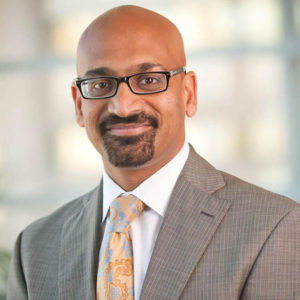
Samir Gupta, MD
Samir Gupta, MD
Gastroenterologist; Professor of Medicine, UC San Diego Health
Twitter: @samirguptaGI
A board-certified gastroenterologist, Dr. Gupta’s expertise is in colorectal cancer (CRC) screening and prevention, specifically evaluation and managing individuals with a family history of colorectal cancer, including individuals with family cancer syndromes such as Lynch syndrome and familial adenomatous polyposis. Hear Dr. Gupta’s insight on CRC screening during the following two sessions at this year’s meeting.
Session Title:
Optimizing Colorectal Cancer Screening
Lecture Title:
“Disparities in CRC Screening and Efforts to Minimize Them”
DDW Tracks:
- Clinical Practice
- Colorectal Diseases
- Health Care Delivery and Disparities and Quality
Date and Time:
Sunday, May 22, 4–5:30 p.m. PDT
CME/MOC:
1.5 hours
CRC screening has been shown to reduce CRC incidence and mortality, but there are many practical hurdles to successfully implementing it. This clinical symposium will cover some of the keys to successful CRC screening programs. Dr. Gupta’s presentation will cover proven and emerging strategies that can help address disparities in CRC screening, as well as opportunities created by recent changes in healthcare policies. Attendees will leave this talk with take-home strategies they can consider implementing in their communities for addressing these disparities.
__________________________________________________________________________________________
Session Title:
Abnormal Colorectal Cancer Screening Test Follow Up: Navigating the Road to Timely Diagnosis with Colonoscopy After Non-Colonoscopy Tests
Lecture Title:
“Policy Imperatives for Non-Colonoscopic Screening”
DDW Tracks:
- Colorectal Diseases
- Health-Care Delivery and Disparities and Quality
Date and Time:
Monday, May 23, 2–3:30 p.m.
CME/MOC:
1.5 hours
Because participation rates in CRC screening are low, screening is increasingly being initiated with non-colonoscopy tests, such as the fecal immunochemical test (FIT, stool DNA-FIT and blood-based biomarkers, as a strategy to promote higher screening participation. Although there are many benefits of increased participation in non-colonoscopy tests, in order to improve CRC outcomes, the rate of follow-up colonoscopies for abnormal results still needs to increase. This session will cover challenges and solutions for achieving high rates of colonoscopy completion after non-colonoscopy tests. Participants will gain an understanding of strategies that can help us realize the potential promise of these strategies for optimizing screening.


